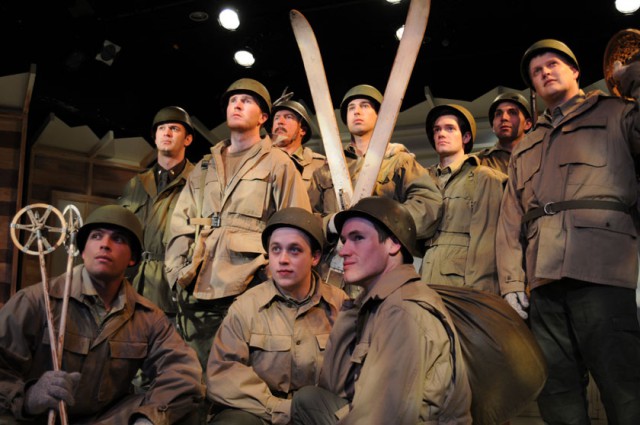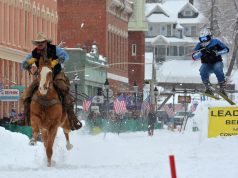
The 10th Mountain Division was an integral player in the rapid development of the Colorado ski industry during the second half of the 20th century. Some would argue it was the most important part. The veterans of the famous division were involved in the founding of Vail (Pete Seibert), Breckenridge (Bill Rounds) and Aspen (Friedl Pfeifer), as well as other related projects like Skiing Magazine (Dick Wilson), and the National Outdoor Leadership School (Paul Petzoldt). The fact that there is a whole system of backcountry huts dedicated to the 10th and statues memorializing them in many resorts is a testament to their indomitable spirit. What most Coloradans don’t know is the more intimate story of the soldiers’ lives — luckily, that is now changing.
The 10th is the first in a series of three plays written by Christopher Willard, executive director of the Breckenridge Backstage Theater, detailing Army life high in the Rockies and the continuing legacy of these famous soldiers throughout the years.
“When I first moved to Breckenridge, I saw the statue dedicated to the soldiers of the 10th Mountain at the River Walk Center and it captivated me,” says Willard. “That launched me upon a nine-year journey to learn their stories and share them with the public.”
The play follows the lives of two main characters— champion skier from Dartmouth Gene Goodman and mountain climber Teddy Pearson — as they join the division for training at Camp Hale and meet their comrades from across the country. The play is a piece of historical fiction based upon Willard’s numerous interviews with surviving members of the elite force.
“What was fascinating is the level of commitment these men showed to become a part of the 10th. Unlike other divisions, they had to apply, receive three letters of recommendation and pass a series of tests,” Willard said. “This was not your average group of soldiers. They were highly intelligent, superb athletes and incredibly dedicated.”
The training the soldiers were put through is legendary. It was a precursor to modern day elite forces training and cumulated in the infamous D-Series where the soldiers spent six weeks living in the open, simulating combat experiences in subzero temperatures. Much of the play focuses on this training and the bonding experiences it created amongst the men.
“One of my favorite parts of the play is the beginning of the second act where I use a line gleaned from my interview with Hugh Evans when he referred to the D-Series as ‘That’s when I knew the Army was trying to kill us,’” says Willard. “I think it summarizes the stress these men were feeling and their drive to succeed.”
The class struggles among the Ivy League students, Olympians, regular army, Colorado muleskinners and Europeans are highlighted throughout the play, as well as their common desire to fight the Germans.
“Over 70 percent of the soldiers in the 10th were smart enough to pass the Officer Candidate Test. That is unheard of, even in today’s military,” Willard says. “It probably explains why so many of them were successful after the war.”
The play is largely set in the Colorado Rockies, but also follows the soldiers to Camp Swift in Texas, their battles in the Italian Apennines Mountains and their return to Breckenridge.
Willard decided to use family as a central theme throughout the play, the men becoming one large family through combat and their attachment to Colorado after the war when so many of them returned.
“The three-play cycle will follow one family through the decades as they live in Breckenridge and contribute to the founding of the ski industry there,” Willard says. “The next play will be called The Roadhouse and focus on events in the mid-’70s in Breckenridge, and the last play will be called The Kingdom and will focus on modern times.”
The plays will trace three generations of one family from the 10th, Gene Goodman or Teddy Pearson’s; his son is the focus of the next play and his granddaughter the final play. As to which character, Willard won’t tell.
“Part of the surprise will be figuring out whose family we will be focusing on and what happens to the rest of the soldiers from the division,” he says.
Instead of presenting the play with props and sets, Chautauqua asked for a staged reading in their intimate Community House.
“We have had a successful run of readings and wanted to build upon it with this uniquely Colorado story,” says Ann Obenchain of Chautauqua. “The intimate feel of this theater, along with the 13 actors reading the play, will be something most people have never experienced. It is magical.”
This will be the final performance of The 10th, which had a successful run of sold out performances at the Backstage Theater.
Respond: [email protected]














